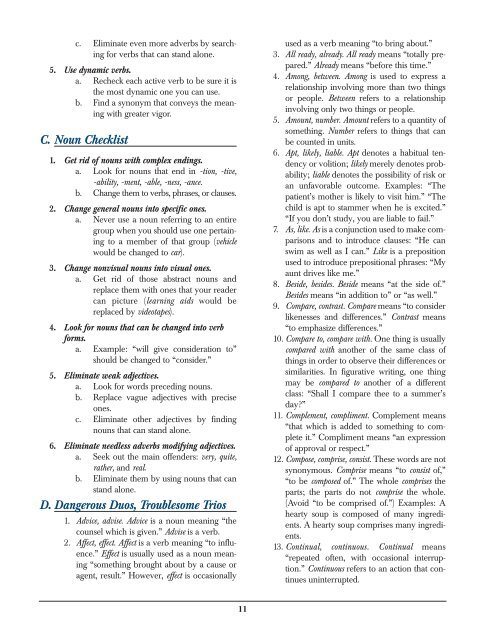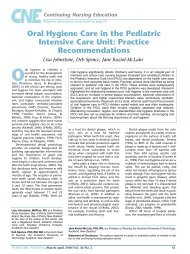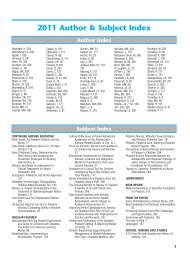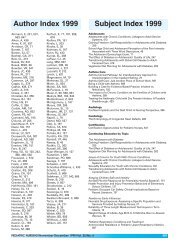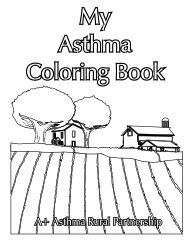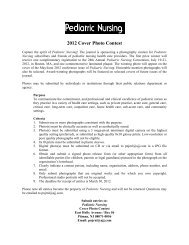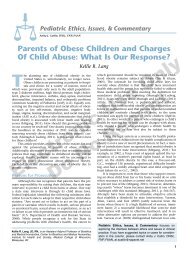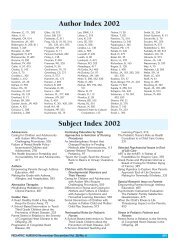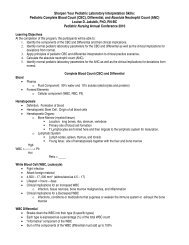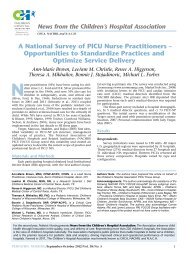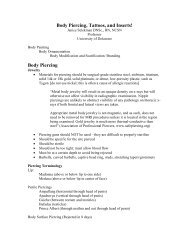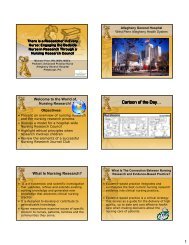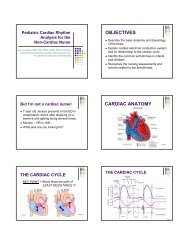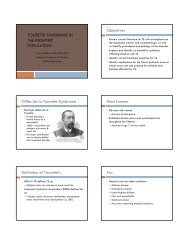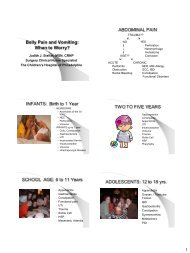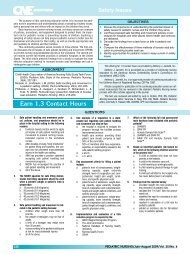Jannetti Publications Guidelines For Authors - Pediatric Nursing
Jannetti Publications Guidelines For Authors - Pediatric Nursing
Jannetti Publications Guidelines For Authors - Pediatric Nursing
You also want an ePaper? Increase the reach of your titles
YUMPU automatically turns print PDFs into web optimized ePapers that Google loves.
c. Eliminate even more adverbs by searching<br />
for verbs that can stand alone.<br />
5. Use dynamic verbs.<br />
a. Recheck each active verb to be sure it is<br />
the most dynamic one you can use.<br />
b. Find a synonym that conveys the meaning<br />
with greater vigor.<br />
C. Noun Checklist<br />
1. Get rid of nouns with complex endings.<br />
a. Look for nouns that end in -tion, -tive,<br />
-ability, -ment, -able, -ness, -ance.<br />
b. Change them to verbs, phrases, or clauses.<br />
2. Change general nouns into specific ones.<br />
a. Never use a noun referring to an entire<br />
group when you should use one pertaining<br />
to a member of that group (vehicle<br />
would be changed to car).<br />
3. Change nonvisual nouns into visual ones.<br />
a. Get rid of those abstract nouns and<br />
replace them with ones that your reader<br />
can picture (learning aids would be<br />
replaced by videotapes).<br />
4. Look for nouns that can be changed into verb<br />
forms.<br />
a. Example: “will give consideration to”<br />
should be changed to “consider.”<br />
5. Eliminate weak adjectives.<br />
a. Look for words preceding nouns.<br />
b. Replace vague adjectives with precise<br />
ones.<br />
c. Eliminate other adjectives by finding<br />
nouns that can stand alone.<br />
6. Eliminate needless adverbs modifying adjectives.<br />
a. Seek out the main offenders: very, quite,<br />
rather, and real.<br />
b. Eliminate them by using nouns that can<br />
stand alone.<br />
D. Dangerous Duos, Troublesome Trios<br />
1. Advice, advise. Advice is a noun meaning “the<br />
counsel which is given.” Advise is a verb.<br />
2. Affect, effect. Affect is a verb meaning “to influence.”<br />
Effect is usually used as a noun meaning<br />
“something brought about by a cause or<br />
agent, result.” However, effect is occasionally<br />
used as a verb meaning “to bring about.”<br />
3. All ready, already. All ready means “totally prepared.”<br />
Already means “before this time.”<br />
4. Among, between. Among is used to express a<br />
relationship involving more than two things<br />
or people. Between refers to a relationship<br />
involving only two things or people.<br />
5. Amount, number. Amount refers to a quantity of<br />
something. Number refers to things that can<br />
be counted in units.<br />
6. Apt, likely, liable. Apt denotes a habitual tendency<br />
or volition; likely merely denotes probability;<br />
liable denotes the possibility of risk or<br />
an unfavorable outcome. Examples: “The<br />
patient’s mother is likely to visit him.” “The<br />
child is apt to stammer when he is excited.”<br />
“If you don’t study, you are liable to fail.”<br />
7. As, like. As is a conjunction used to make comparisons<br />
and to introduce clauses: “He can<br />
swim as well as I can.” Like is a preposition<br />
used to introduce prepositional phrases: “My<br />
aunt drives like me.”<br />
8. Beside, besides. Beside means “at the side of.”<br />
Besides means “in addition to” or “as well.”<br />
9. Compare, contrast. Compare means “to consider<br />
likenesses and differences.” Contrast means<br />
“to emphasize differences.”<br />
10. Compare to, compare with. One thing is usually<br />
compared with another of the same class of<br />
things in order to observe their differences or<br />
similarities. In figurative writing, one thing<br />
may be compared to another of a different<br />
class: “Shall I compare thee to a summer’s<br />
day?”<br />
11. Complement, compliment. Complement means<br />
“that which is added to something to complete<br />
it.” Compliment means “an expression<br />
of approval or respect.”<br />
12. Compose, comprise, consist. These words are not<br />
synonymous. Comprise means “to consist of,”<br />
“to be composed of.” The whole comprises the<br />
parts; the parts do not comprise the whole.<br />
(Avoid “to be comprised of.”) Examples: A<br />
hearty soup is composed of many ingredients.<br />
A hearty soup comprises many ingredients.<br />
13. Continual, continuous. Continual means<br />
“repeated often, with occasional interruption.”<br />
Continuous refers to an action that continues<br />
uninterrupted.<br />
11


